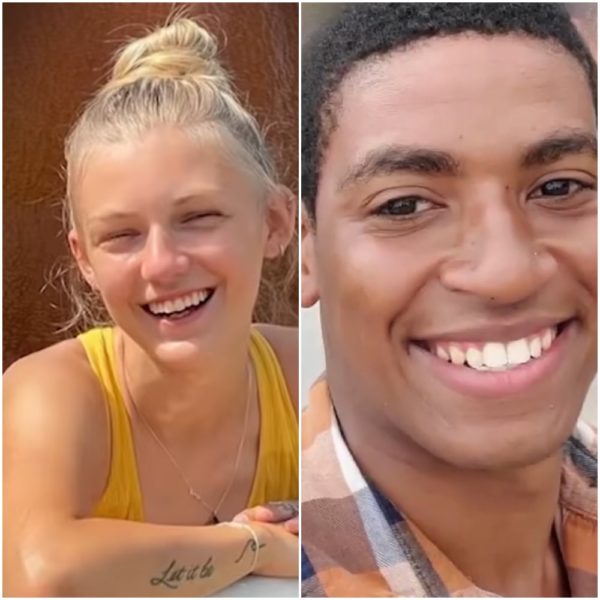Public Outrage Erupts as Missing Black People Are Ignored by Mainstream Media Unlike the Gabby Petito Case, Joy Reid Calls It the ‘Missing White Woman Syndrome’
Outrage over the lack of media coverage on missing people of color has been renewed by the national spotlight placed on the case of missing 22-year-old Gabby Petito — a white Florida woman who disappeared after a month-long van excursion with her fiancé, Brian Laundrie.
The aspiring social media influencer was reported missing by her family on Sept. 11. A little more than a week later, investigators located remains believed to be hers near a national park in Wyoming; authorities now have confirmed the remains to be those of Petito and ruled her death a homicide. Since the report of Petito being missing, she has remained an above-the-fold story, trending topic, and now her fiancé — who is considered a person of interest — has vanished, further adding fuel to the case’s national appeal.
However, at the same time, anger also has cropped up among individuals on social media drawing attention to the countless missing men, women and children — all of which are people of color. Their cases have largely gone unreported locally and nationally. Aside from posts on social media, their disappearances have been ignored to the point that family members and strangers have taken matters into their own hands.
Such is the case of Daniel Robinson. The 24-year-old geologist from Tempe, Arizona, went missing June 23 after leaving his worksite in Buckeye. According to reports, Robinson did not notify anyone of his intended whereabouts prior to leaving. Some coworkers told Fox 10 Phoenix that Robinson’s behavior in the days leading up to his disappearance made it appear he was “not himself.” Still, there are no clues that explain why the outspoken geologist’s Jeep Renegade was found just miles away from his job in a ravine.
Desperate for answers, his father, David Robinson, relocated from South Carolina, launched a GoFundMe and hired a private investigator to help piece together answers. What they currently know is that the vehicle was involved in multiple crashes, and that Robinson’s clothing, cell phone, wallet and keys were found at the scene. But this information has only made waves online in recent days because of the outrage spurred by Petito’s missing case becoming a national priority.
“The Buckeye Police Department is still working on the case,” David Robinson said. “They found the vehicle, but they didn’t do a forensic-type investigation, because they didn’t see any blood in the vehicle.” As a result, he feels the picture being painted by law enforcement is that his son willingly disappeared. Robinson fails to believe that and wants every search effort exhausted in order to find answers, and hopefully his son.
“The narrative that’s out there is my son just walked off on his own,” Robinson said in an interview for West Valley View newspaper. “Of course, as a family, we don’t agree with that. We’re still working out some things.”
Online, the topic of missing persons has sparked commentary from people torn up over the continued discriminatory media practices. “I wish they would treat missing black people the same as they did with the Gabby Petito case ,” one person tweeted.
Another wrote, “So many black people have been coming up missing but NONE received the media coverage that Gabby Peitio has!!!! It’s sickening!!!!!!!”
Social media was already abuzz with countless flyers of other missing people being shared when MSNBC journalist Joy Reid joined in on the conversation. During a Sept. 20 taping of her show “The Reid Out,” she addressed the disparity in coverage as it relates to Petito’s disappearance and those of people of color.
“It goes without saying that no family should ever have to endure that kind of pain, and the Petito family certainly deserve answers and justice,” she said. “But the way this story has captivated the nation has many wondering why not the same media attention when people of color go missing?”
She continued, “Well, the answer actually has a name: missing white woman syndrome,” she continued noting the term she said was coined by late journalist Gwen Ifill. It “describe[s] the media and public fascination with missing white women like Lacy Peterson or Natalie Holloway, while ignoring cases involving missing people of color.”
A panelist, Lynette Grey Bull of the Not Our Native Daughters Foundation, stated plainly that the disparity is rooted in racism. “It’s systemic racism. We’re still fighting oppression in our tribal communities,” Bull said. “We are still facing inequality across the board, whether it comes to our community, housing, jobs.”
The conversation struck a nerve with many, some of whom applauded Reid for “calling a thing a thing” and others who felt her comments were inflammatory.

